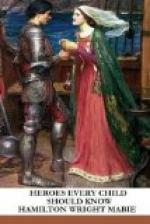Edward I would have entered Scotland at the head of a large army, before he had left Bruce time to conquer back the country. But very fortunately for the Scots, that wise and skilful, though ambitious King, died when he was on the point of marching into Scotland. His son Edward II neglected the Scottish war, and thus lost the opportunity of defeating Bruce, when his force was small. But when Sir Philip Mowbray, the governor of Stirling, came to London, to tell the King, that Stirling, the last Scottish town of importance which remained in possession of the English, was to be surrendered if it were not relieved by force of arms before midsummer, then all the English nobles called out, it would be a sin and shame to permit the fair conquest which Edward I had made, to be forfeited to the Scots for want of fighting.
King Edward II, therefore, assembled one of the greatest armies which a King of England ever commanded. There were troops brought from all his dominions, many brave soldiers from the French provinces, many Irish, many Welsh, and all the great English nobles and barons, with their followers. The number was not less than one hundred thousand men.
King Robert the Brace summoned all his nobles and barons to join him, when he heard of the great preparations which the King of England was making. They were not so numerous as the English by many thousand men. In fact, his whole army did not very much exceed thirty thousand, and they were much worse armed than the wealthy Englishmen; but then, Robert was one of the most expert generals of the time; and the officers he had under him, were his brother Edward, his faithful follower the Douglas, and other brave and experienced leaders. His men had been accustomed to fight and gain victories under every disadvantage of situation and numbers.
The King, on his part, studied how he might supply, by address and stratagem, what he wanted in numbers and strength. He knew the superiority of the English in their heavy-armed cavalry, and in their archers. Both these advantages he resolved to provide against. With this purpose, he led his army down into a plain near Stirling. The English army must needs pass through a boggy country, broken with water-courses, while the Scots occupied hard dry ground. He then caused all the ground upon the front of his line of battle, to be dug full of holes, about as deep as a man’s knee. They were filled with light brushwood, and the turf was laid on the top, so that it appeared a plain field, while in reality it was as full of these pits as a honeycomb is of holes. He also, it is said, caused steel spikes, called calthrops, to be scattered up and down in the plain, where the English cavalry were most likely to advance, trusting in that manner to lame and destroy their horses.




